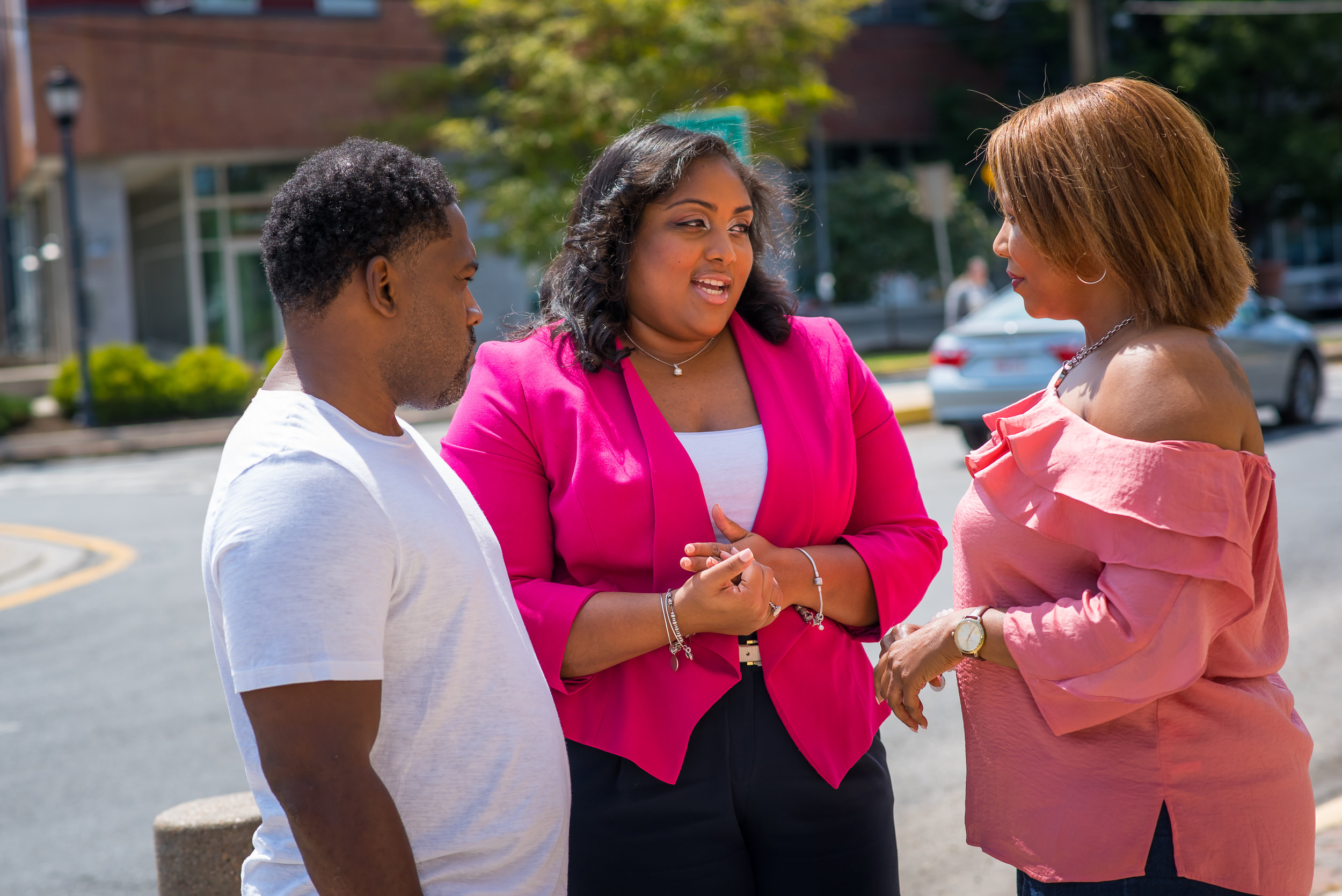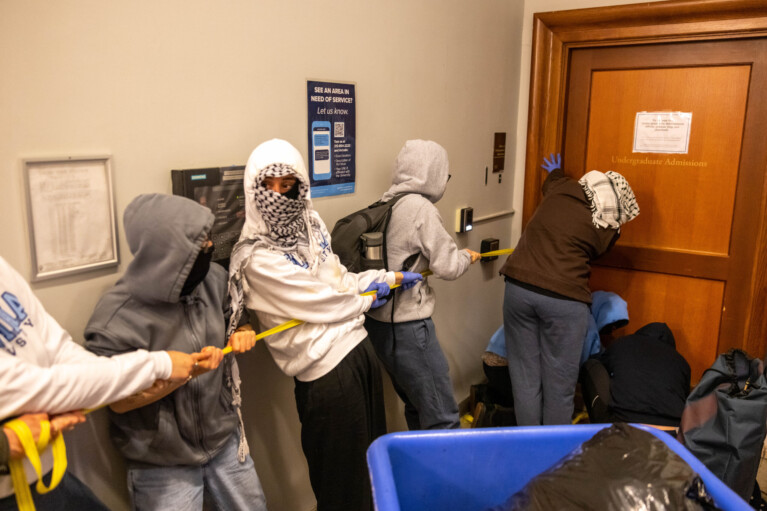
State Del. Wanika Fisher leans across the table over breakfast at Politics and Prose in Hyattsville and shows a reporter pictures she took on her phone of an art exhibit at the Musée d’Orsay in Paris. Portraits of black women painted in oil by white classical-era European artists look pensively back.
“That image of that woman, because she was in a piece of art, goes beyond time,” Fisher, a Prince George’s County Democrat, says of one such piece. “No one knows her name. Nobody knows her struggle. She was never important. But her image will see millennia.”
Art, says Fisher, is the footprint people leave behind, something that “goes beyond us and lasts.”
Fisher’s name may not be remembered for millennia, but she’s trying to make her mark.
At 30 years old, Fisher represents District 47B, a 4-square-mile area carved out of District 47, in the House of Delegates. She is the second-youngest woman serving in the Maryland General Assembly and the youngest woman of color.
Fisher herself has an artistic side — she paints, bakes, sings and enjoys fashion — but her friends said she is likely to leave her mark through the changes she makes to her community as a lawyer and a politician.
“Anywhere I go in life, I always want it to be better than when I found it,” Fisher said.
Fisher is part of a recent influx of women politicians, many of whom were catalyzed by the 2016 election of President Trump.
It is hard for women to break into a political system system “invented by a bunch of men,” Fisher said, in part because it elevates traditionally male traits like speaking loudly and commanding a room.
“Our entire system was created by and for land owning men, right?” Fisher said. “So we are infiltrating a system that was never designed for you or me.”
A Washington Post columnist in 2018 called Fisher “Maryland’s version of Alexandria Ocasio-Cortez” because she shares youth and a passion for social justice with the first-term Democratic representative from New York.
“People always say there was a wave of women,” Fisher said. “[But] the undercurrent of young women” — she emphasized “young” — “being like, ‘we’re here, we don’t care, we’re running,’ it’s definitely great.”
Fisher’s youth is an asset, according to Monica Roebuck, one of Fisher’s sorority sisters at the Iota Gamma Omega chapter of Alpha Kappa Alpha.
“I have a lot of respect for her,” said Roebuck, a public school teacher and political activist from Bowie who is 47. “She’s a young person, she’s a millennial. … I’m much older than Wanika, but her and I bonded, I guess because she has a passion and a drive to help change the community, and so do I.”
Fisher said she tries to learn from people older than she is, but she believes younger politicians bring a sense of hope and energy that older politicians, for all their skill at the business of legislation, may not have.
“I think people in politics sometimes function on fear,” Fisher said. “Whether that’s like Trump, who is a fearmonger, or whether it’s establishment politics that say ‘you can’t do this,’ and, like, ‘your voice is unwelcome at the table.’”
Legislative skill and youthful enthusiasm should work together, Fisher said.
“Nobody knows how to win the bill through that Congress like Nancy Pelosi, man, OK?” Fisher said with a laugh. “And I think that’s where the establishment and the new voices can work together.”
Unlike many older politicians, Fisher did not work her way up through a series of lower offices like positions on the school board or the city council.
“She ran for the responsibilities that she wanted, and she won, and she’s been doing a great job,” said Jolene Ivey, a Prince George’s County council member and former Maryland delegate who has been a mentor for Fisher since the younger woman’s college days.
She started the 2018 election cycle running for state Senate, but decided to seek the House seat instead. To win in District 47B — which covers inside-the-Beltway communities like Langley Park, Adelphi and portions of Hyattsville — Fisher defeated the incumbent delegate, Carlo Sanchez, who had been appointed to the seat, by 20 points in the Democratic primary.
Fisher grew up in Rye Brook, N.Y., just north of New York City, and came to Maryland to attend the University of Maryland. She earned her law degree at Penn State University, started working in New York, then returned to Maryland on a whim when Ivey became a candidate for lieutenant governor in 2013.
Fisher recalled “throwing everything in the car and driving down like a crazy person” the same day Ivey asked for her help. After the campaign Fisher decided to stay because she realized how much she loved and missed Maryland.
Multicultural background
As a first-generation immigrant of mixed heritage — her mother is South African Indian and her father is from the Yoruba region of Nigeria — Fisher said she learned at a young age the importance of civic engagement.
“My family wouldn’t exist without the laws like interracial marriage and immigration laws,” Fisher said. “It just very much came real to my family’s journey.”
Del. Jheanelle Wilkins (D-Montgomery) said she believes Fisher’s multicultural background helps her empathize with the people she represents, many of whom are Latinx.
“When we work on legislation, she sees her family in those bills,” Wilkins said.
Fisher’s mother, Patricia Fisher, said she and her husband always tried to teach their children “right from wrong,” but the idea to go into politics was entirely her daughter’s idea.
“I think she was born a politician,” Patricia Fisher said.
The younger Fisher said it was in middle school that she first realized she had power to make changes to her community. She said she was frustrated that it was difficult to walk to school because because her neighborhood in Rye Brook lacked paved sidewalks, and she worried about the air pollution from her and her classmates’ daily commute by car.
The preteen wrote a petition encouraging the local government to pave the neighborhood sidewalks. She spent weeks gathering hundreds of signatures from everyone in the neighborhood, knocking on doors, standing outside her school and talking to parents at her after-school programs.
“Wherever she could find anybody to put a signature, she would,” said Fisher’s mother. “It was like selling [Girl Scout] cookies, you know?”
Her petition was successful when the town government built sidewalks for the community soon after.
Fisher serves on the House Judiciary Committee, making the most of her background in law — Fisher, once a prosecutor, works as criminal defense and personal injury attorney for the nine months the legislature is not in session.
“I can sleep at night knowing that she’s on that committee,” Roebuck said. “We need someone in that position who is going to fight.”
Fisher was the primary sponsor of six bills this legislative session, all but one of which went through the Judiciary Committee. Three made it through the legislature and have been signed into law by the governor.
One of the bills that passed is Maryland’s first labor trafficking statute, making coerced labor a crime. The second removes the time limit on rape victims’ ability to receive money from the state for psychological care related to the trauma. The third makes it illegal for correctional facilities to put pregnant inmates in solitary or restrictive cells except when justified for specific safety or health reasons.
The unsuccessful bills attempted to simplify requirements for forensic evidence admission in courts; to allow judges to place defendants on probation before issuing a guilty verdict; and to require the state add links to online voter registration to the template it uses for its official websites.
“I am happy with my first session,” Fisher said. “You always wish you could do more,” like getting more bills passed, “but for the most part, I’m proud of all that I’ve accomplished.”
Fisher said her freshman year was not what she expected, especially with the death of House Speaker Michael E. Busch (D) in April, one day before the end of session.
“Even though I worked in Annapolis before being elected, nothing can really prepare you for the office [and] the different ups and downs the 90 days holds,” Fisher said.
For the next session, which starts in January 2020, Fisher has a laundry list of community-centered goals for her time in office, ranging from trash clean up to better elder care.
“She definitely has a heart for people who are the underdog,” Roebuck said. “She wants to make sure that she levels the playing field for every person.”
Roxanne Ready is a 2018-2019 graduate student fellow in the University of Maryland’s journalism program. She launched her journalism career as editor-in-chief for the Anne Arundel Community College student newspaper. She writes investigative and enterprise stories for Capital News Service, and freelances in and around Annapolis and Washington, D.C. Her Twitter handle is @ReadyReporting.



 Creative Commons Attribution
Creative Commons Attribution